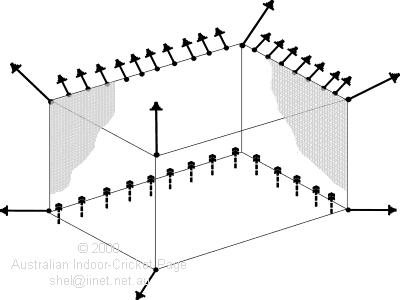INDOOR
CRICKET WORLD
|
Indoor Cricket |
|
The Net The net enclosing an Indoor-Cricket court must be very tightly tensioned. This allows consistency in the ball's bounce off the net. It is also a safety feature - players are securely protected from hitting any walls or columns which may be close to the court, and there is less chance of getting fingers caught in tight nets. It also allows spectators to be closer to the game, as players hitting the net will not stretch it far. The court is defined by a cubic frame of high-strength steel cable, to which the netting is securely attached. Tensioning of the net is achieved by tensioning of this "cube". The lower four cables of the cube are secured directly into the concrete floor. The four lower corners are usually tensioned to anchor points also set into the concrete. The top four cables are all fastened at the corners to anchor points, located on the ceiling/inner-roof. These take the main tension, and help form the 'box' structure of the cables. These top cables are then further fastened to the ceiling for additional support. The shape of the box thus formed is achieved by adjusting the tension mainly in the eight corners, with finer tuning possible by individually adjusting the extra attachments along the top edges.
Note-
in this diagram, all anchorings are not shown. Courts are usually constructed in factory-units, or purpose-built centres. However, they can also be constructed in a free-standing configuration, with an external skeleton of steel, also supported by cables, taking the place of the ceiling. Such a configuration was used at the World Cup in Melbourne in 1998. Unless marked or
clearly identified as otherwise, all images and
photographs are the original work of the author, who
retains copyright and ownership. For enquiries on
the use and/or purchase of photographs, please
contact us HERE
. Textual content is also the original work of the
author (unless marked or identified as otherwise)
and subject to copyright and the author's ownership.
Please Contact
Us for information on use of any content of
these pages. |
© Indoor Cricket World 2003
